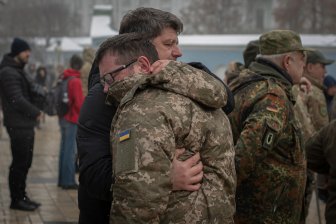Putin can only be defeated through force, not negotiation: former Ukrainian president – National | Globalnews.ca
Russia‘s war in Ukraine can only be ended by force, not through negotiation, according to former Ukrainian president Petro Poroshenko.
His comment comes as Ukraine says that more than 10,000 Ukrainian troops have been killed since the brutal conflict began, when Russian President Vladimir Putin illegally invaded the country earlier this year.
“Putin understands only the language of strength,” Poroshenko told The West Block’s Mercedes Stephenson in an interview, aired Sunday.
“Everybody said that we should speak with Russia. ‘You should have a negotiation with Russia.’ My answer was, this is true … we have one of the best negotiators in the world. And this best negotiator’s name, is … (the) armed forces of Ukraine.”
Read more:
More than 10,000 Ukrainian troops killed in Russia’s war, official says
Read More
-
![]()
More than 10,000 Ukrainian troops killed in Russia’s war, official says
Putin understands “peace” as meaning a “ceasefire for a short-term period of time,” Poroshenko explained, at which point Putin would “renew” attacks from the Russian armed forces.
Peace in Ukraine can only truly be achieved, Poroshenko added, through “victory for Ukraine.”
But that victory requires help from the international community, Poroshenko told Stephenson — starting with more weapons.
“This is my message, (what we are waiting for) from the whole world, in particular from Canada: weapons, weapons and weapons,” he said.

He said he’d also like to see allies slap Putin with more sanctions and embargoes, while at the same time continuing to provide financial support to Ukraine. Ukraine’s allies should also build an anti-Putin coalition that can investigate Russian war crimes, and finally, he said, Ukraine must become a member of the European Union and the North Atlantic Treaty Organization (NATO).
Canada has hit Russia with a number of sanctions since the war began earlier this year and provided Ukraine with hundreds of millions of dollars in military and other aid to date. The government has also committed to providing the Ukrainians with more than $2 billion in financial assistance this year.
Last week, Canadian Justice Minister David Lametti signed the Berlin Declaration alongside his G7 counterparts, which vowed Canada’s assistance and its coordination with global partners as alleged war crimes in Ukraine are investigated.
But Canada has not yet issued public support for Ukraine’s bid to become a NATO member.
Read more:
‘No impunity’: Canada joins G7 pledge to coordinate Russian war crimes probes
When pressed on whether he expects Canada will back a bid by Ukraine to join NATO — and whether he thinks Canada will send more weapons to Ukraine — Poroshenko said he has “no doubt.”
“We count on Canada and we feel that this is a position of real friend — friend in need is a friend indeed,” he said.
Ukraine needs Canada’s support for its NATO bid, Poroshenko explained, because its membership in the international treaty is “the only instrument (with which) we can guarantee the security in Europe, guarantee the security in the whole world.”
A number of NATO-member countries touch on Ukraine’s borders, including Poland, Romania, Slovakia and Hungary. Should the conflict in Ukraine bleed over into one of these neighbouring countries, it could trigger NATO’s collective defence principle, which — if NATO decides to invoke that principle — would plunge many more countries into direct conflict with Russia, including Canada.

Questions about NATO and collective defence recently emerged following a now-retracted report from The Associated Press, which claimed that a Russian missile had struck Poland, killing two people. While a missile did land, NATO and Polish officials later confirmed it was not Russian — but rather was an accidental hit by a Ukrainian missile fired in self-defence.
When asked whether Putin is willing to strike NATO countries, Poroshenko said that is “the most open question” he has.
“There is (not) any red line for Putin,” he said.
Meanwhile, the war continues to rage on in Ukraine.
Russian forces have kept up rocket attacks on infrastructure and airstrikes against Ukrainian troop positions, Ukrainian armed forces officials said on Friday. Moscow’s recent military push has focused on a dozen towns including Bakhmut and Avdiivka — key targets for Russia in the embattled east.
The UN human rights office, in its latest weekly update published Monday, said it had recorded 6,655 civilians killed and 10,368 injured, but has acknowledged that its tally includes only casualties that it has confirmed and likely far understates the actual toll.
Read more:
Canada funded group clearing landmines in Ukraine after Russian retreat
With winter right around the corner, Ukrainians have been bracing for freezing temperatures as Russia’s campaign has recently hit infrastructure including power plants and electrical transformers, leaving many without heat, water and electricity.
Ukraine has also faced a blistering onslaught of Russian artillery fire and drone attacks since early October. The shelling has been especially intense in southern Kherson since Russian forces withdrew and Ukraine’s army reclaimed the southern city almost three weeks ago.
In addition to the continued strikes, several Ukrainian embassies abroad have received “bloody packages” containing animal eyes, the foreign ministry said on Friday, after a series of letter bombs were sent to addresses in Spain including Ukraine’s embassy in Madrid.
Ukraine has been grappling with this war for more than nine months.
— With files from The Associated Press
© 2022 Global News, a division of Corus Entertainment Inc.
For all the latest World News Click Here
For the latest news and updates, follow us on Google News.





